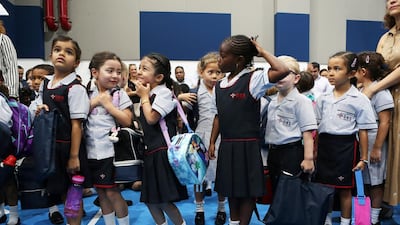The longest and saddest goodbyes in the UAE take place in the summer. The end of a school year is often an opportune time for foreign residents to return home.
Going back can be challenging for children and adolescents though, especially if they have spent most of their formative years in the UAE. These young people will return to their homelands as third culture kids, or TCKs, individuals who have spent a number of developmental years outside their parents’ country of origin.
This return home is often accompanied by a reverse culture shock. This is when the returnee has difficulty making cultural adaptations and psychological adjustments to the new reality of the home culture, a place they might only have visited infrequently, for a few weeks at a time.
The research exploring culture shock and reverse culture shock often describes people experiencing high levels of stress, loneliness, depression and anxiety.
Returnee TCKs frequently report feeling like they don’t belong, experiencing a sense of restlessness and alienation within their so-called home nation. Dissatisfaction is exacerbated by high expectations and some TCKs have overly rosy imaginings about the motherland.
This, of course, is not the whole story. TCKs are not doomed to be awkward characters, melancholic misfits languishing at the fringes of society. The international experience of being a third culture kid has many potentially powerful positives too.
They are reported to be good mediators, highly flexible, mature beyond their years, open-minded, curious, cross-culturally competent and have a three-dimensional world view. This last quality relates to seeing the world as a global entity populated by individuals with the same basic human needs and frailties. The TCK, therefore, is rarely small-minded, intolerant or parochial.
_____________________
Read more from Justin Thomas:
Anthony Bourdain's tragic death shows depression has many faces
Why traditional grading gets a capital F for fail
How much wealth makes you happy?
_____________________
In 2008, when Barack Obama was elected as the 44th president of the US, third culture kids got their poster boy. Mr Obama, having spent a period of his childhood in Indonesia, perfectly embodied the TCK ideal. Since then there has been a growing appreciation for the positive attributes that they bring to the workforce and society as a whole.
Globalisation has meant that international careers have become commonplace. Consequently the number of TCKs has risen rapidly over the past few decades too.
No one knows the exact number but at the turn of the century, best estimates suggested that there were about half a million in the US and four million globally.
In the US, the frequency of TCKs returning from overseas to study in American universities has led to them being recognised as an important and distinct cultural group.
Some universities make special efforts to ensure the wellbeing and meet the needs of this growing population within their student bodies.
An article published in the US Foreign Service Journal last year strongly advocates a supportive approach and also provides a name-and-fame list of US colleges and universities already offering special orientation sessions and support services for a third culture generation.
The extra effort to accommodate and integrate TCKs into university life is arguably motivated by the increasing value placed on the skills and attitudes these global citizens bring with them.
As some of our societies appear to be lurching toward the far right, becoming less tolerant and more insular, TCKs might just be an important part of the antidote.
According to the latest CIA World Factbook, the UAE has one of the highest foreigner-to-citizen ratios in the world and is therefore host to many TCKs.
So what can we do to ensure they are well-equipped for their re-entry into the culture of their homeland?
Many workplaces in the UAE have an orientation for new arrivals designed to help raise awareness about sociocultural dos and don’ts of everyday life. Perhaps more schools, colleges and organisations need to do something similar on exit too.
The UAE's new ruling on residency visas will be helpful. Having parents on a 10-year visa provides greater stability and might offset some of the negative consequences of being a TCK.
For example, TCKs are often impacted by the grief associated with frequently losing friends. At the end of each school year, they say goodbye forever to a sizeable portion of their classmates and perhaps even a best friend or two.
Equally, the new 10-year visa aimed at exceptional students looks like a great way for the UAE to benefit more from the highly desirable third culture talent that it helps to produce. That can only be to the benefit of the country – and its multicultural young generation.
Dr Justin Thomas is professor of psychology at Zayed University and author of Psychological Well-Being in the Gulf States
Follow The National's Opinion section on Twitter


